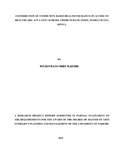| dc.description.abstract | How to finance and provide health care for the more than 1.3 billion rural poor and informal
sector workers in low- and middle-income countries is one of the greatest challenges facing the
international development community. Community Based Healthcare Insurance schemes
(CBHIS) like other solidarity based insurance initiatives have the goal of finding ways for
communities to meet their health financing needs through pooled revenue collection and resource
allocation decisions made by the community. They provide insurance services by allowing
members to pay small premiums on a regular basis to offset the risk of needing to pay large
healthcare fees upon falling sick. This study was set to establish the contribution of the CBHIS
towards access to healthcare by the members of Afya Yetu scheme in Chehe sub-location,
Mathira East Sub -County, Nyeri County. The objectives were to establish how sensitization of
members influences access to healthcare; establish how risk pooling influences access to
healthcare by members; assess how linkages with nearby healthcare providers contributes to
access of healthcare and to establish how the choice of an insurance benefit package affects
access to healthcare. This study uses a descriptive survey design chosen so as to enable the
researcher to describe the state of affairs at the scheme. The unit of analysis consists of a sample
of 120 subjects systematically sampled from a target population of 289. The data was collected
using a questionnaire which had both open and close ended questions. A pilot study comprising
of 10 respondents was conducted in an adjacent sub-location and the output was used to ensure
completeness of data collection instrument. Questionnaires for the committee members were self
administered while the others were researcher administered. Data collected was both qualitative
and quantitative; qualitative data is analyzed using content analysis the quantitative data was
coded and entered into statistical package for social sciences version 20 and analyzed using
descriptive statistics. Findings of the study show that 66.7% of the leaders indicated that the
awareness of members affects the way they seek healthcare while 82.5% of the contributors
indicated that the knowledge gained by being in the scheme had changed the way they sought
health care. The researcher concludes that access to health insurance can have a positive impact
on their members’ economic and social situation. To enlarge access to health care for the poor
and the rural population, community-based health insurance schemes can be an important
element and a first step. It allows some limited pooling of risks and thereby leads to an
improvement in the health care system, where most people otherwise have to pay their health
expenditure out of pocket. The research findings are of benefit to the organization implementing
this programme and others doing the same in other areas as they can utilize the recommendations
advanced by the study. | en_US |

